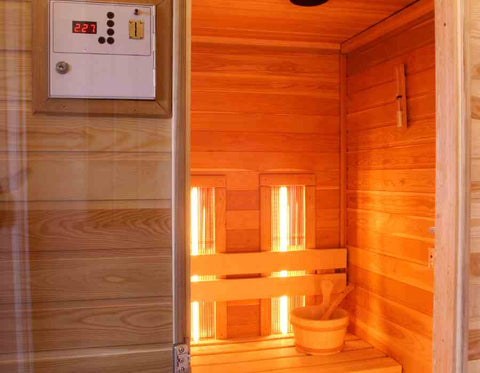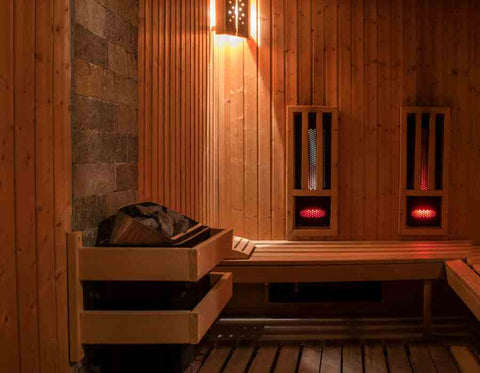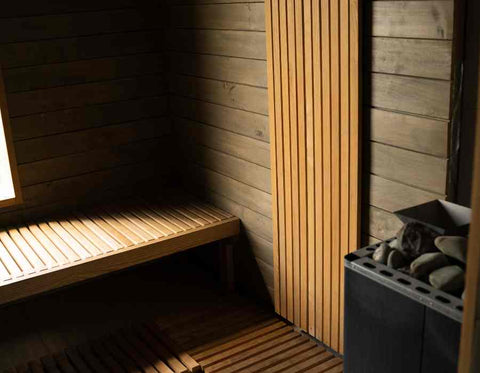Sauna for Mental Health: Boosting Moods and Fighting Depression
Saunas have long been appreciated for their relaxation and potential health benefits, but recent research is shining new light on the positive impact sauna use can have, specifically on mental health. From boosting moods to relieving depression symptoms, regular sauna sessions are proving to be a valuable complementary approach alongside other lifestyle changes and treatments for mental wellness.
This article explores the potential mental health benefits of sauna use, from the mood-enhancing physiological effects of heat exposure to the opportunities for mindfulness and social connection. We'll examine how integrating repeated sauna therapy into regular self-care routines can aid in stress relief, improve sleep, spark creativity, and more.

Types of Saunas
It's important to understand the different types of saunas available, as each offers a unique experience and set of benefits.
Traditional Finnish Saunas
Traditional Finnish saunas are characterized by their dry heat, with sauna temperatures ranging from 70°C to 100°C (158°F to 212°F). Traditional saunas use a wood-burning, electric, or gas heater to heat stones. Water can be thrown onto the hot stones to generate steam. The high temperature and low humidity create an environment that promotes sweating and deep relaxation.
Infrared Saunas
Infrared sauna uses infrared heaters to emit infrared light experienced as radiant heat, which is absorbed directly into the skin. Unlike traditional saunas, which heat the air, infrared saunas heat the body directly. This allows for a lower ambient temperature, usually between 45°C and 60°C (113°F and 140°F), making it a more comfortable option for those who may find the high heat of traditional saunas too intense.
Infrared sauna therapy penetrates deeper into the tissues. Infrared sauna therapy offers enhanced detoxification and relaxation benefits.
Steam Rooms (Turkish Saunas)
Steam rooms, also referred to as Turkish saunas or hammams, provide a high humidity experience with temperatures around 40°C to 50°C (104°F to 122°F). The steam-filled environment is excellent for hydrating the skin and respiratory system, and the gentle heat helps relax muscles and ease tension, contributing positively to mental well-being.
Smoke Saunas
Smoke saunas are a traditional Finnish variant where wood is burned in a large stove without a chimney, filling the room with smoke. Once the room is sufficiently heated, the smoke is vented out, leaving behind residual heat. This type of sauna offers a unique, gentle heat experience with the added aroma of wood smoke, which many find soothing and conducive to relaxation.
Portable and Home Saunas
Portable and home saunas offer a convenient option for those looking to enjoy sauna benefits without visiting a spa or gym. Sauna at home can range from foldable infrared saunas to small modular units that can be installed at home. While they may not replicate the full experience of larger, traditional saunas, they provide a practical solution for regular use, contributing to mental health maintenance.
Understanding the Connection between Sauna Use and Mental Health

The relationship between sauna use and mental health is rooted in a long history of saunas being used as a means for purification and relaxation across various cultures. The warmth and solitude of a sauna session offer a unique environment that promotes a sense of peace and well-being, which can have profound effects on one's mental state.
Historical Context and Cultural Significance
Saunas have been integral to many cultures worldwide, most notably in Finland, where the tradition dates back thousands of years. In these societies, saunas have been more than just a place to bathe; they've been communal spaces for relaxation, socialization, and spiritual cleansing. This cultural heritage underlines the intrinsic value of saunas as spaces for mental and emotional rejuvenation.
Modern Appreciation and Adoption
In recent years, the sauna has been embraced globally as a wellness tool, with increasing evidence supporting its mental health benefits. People today use sauna sessions as a deliberate break from the fast-paced and often stressful daily life, finding in them a refuge where they can unwind, reflect, and revitalize.
The Science Behind Sauna Use and Improved Mental Health

The positive impact of sauna use on mental health is not just anecdotal; it's backed by scientific research that sheds light on the physiological mechanisms at play. Understanding these mechanisms can help you appreciate why sauna bathing sessions can benefit mental well-being.
Endorphin Release and Stress Reduction
One of the immediate effects of entering a hot sauna is a significant increase in body temperature, which can lead to the release of endorphins, the body's natural feel-good chemicals. This endorphin rush is similar to the one experienced after physical exercise, often referred to as the "runner's high," and can lead to an immediate uplift in mood and reduced stress levels.
Heat Shock Proteins and Neurogenesis
Exposure to high heat in a sauna induces the production of heat shock proteins, which protect cells from stress and may help repair damaged proteins. There's emerging evidence that these proteins can also support brain health by fostering neurogenesis (the growth of new neurons), which is essential for cognitive function and mental health.
Improved Autonomic Nervous System Function
Regular sauna use has been shown to potentially improve the autonomic nervous system's function, which controls bodily functions not consciously directed, such as breathing, the heartbeat, and digestive processes. By enhancing parasympathetic (rest and digest) activity and moderating sympathetic (fight or flight) responses, sauna sessions can potentially help maintain a more balanced and less stress-reactive state.
Sleep Quality and Mental Health
Sauna use, particularly in the evening, can aid in the natural decrease of body temperature post-session, which signals the body to prepare for sleep. Improved sleep quality and duration are closely linked to better mental health outcomes, as poor or insufficient sleep is a significant risk factor for the development and exacerbation of mental health disorders.
Sauna Use as a Tool for Mood Enhancement

Sauna sessions offer a tranquil retreat where the warmth and solitude can significantly enhance one's mood. This section delves into the ways sauna use can elevate mood, reduce stress, and contribute to a more positive mental outlook.
Immediate Mood Uplift through Endorphin Release
One of the most immediate effects of sauna use is the potential release of endorphins, the body's natural mood elevators. This biochemical change can lead to an instant improvement in mood, akin to the euphoria often experienced after intense physical exercise.
The warmth of the sauna stimulates the body in a way that prompts this endorphin release, offering a natural and effective way to boost one's mood.
Stress Relief and Relaxation
The heat from a sauna session helps to relax muscles, ease tension, and promote relaxation. This physical relaxation can translate into mental relaxation, as the body's response to heat helps to lower cortisol levels, the body's primary stress hormone.
The reduction in stress and tension can leave individuals feeling calmer, clearer, and more relaxed, contributing to an overall better mood.
Enhanced Mindfulness and Mental Clarity
Sauna sessions provide a unique opportunity for mindfulness and meditation, as the enclosed, quiet space allows for introspection and mental clarity.
The absence of distractions encourages individuals to focus on their breathing, practice mindfulness, or simply enjoy a moment of quiet, all of which can significantly enhance mood and overall mental well-being.
Sauna Therapy and Its Role in Fighting Depression

The therapeutic heat of a sauna not only aids in mood enhancement but also plays a significant role in combating depression. This section explores how sauna therapy can be a valuable complementary approach to the management and treatment of depression.
Physiological Effects on Depression Symptoms
Regular sauna use can influence several physiological mechanisms that are directly linked to depression.
For example, the heat stress from sauna use can lead to hormonal changes that are beneficial for combating depression, such as the reduction of cortisol and the increase in serotonin and dopamine levels, neurotransmitters that play key roles in regulating mood.
Various studies have explored the impact of infrared sauna therapy on mildly depressed patients, characterized by symptoms such as fatigue, a lack of appetite, and cognitive concerns. These investigations revealed that undergoing far infrared sauna treatment notably enhanced their desire to eat and diminished their cognitive difficulties.
Sauna Use and Sleep Improvement
Depression is often associated with sleep disturbances, including difficulty falling asleep, staying asleep, or experiencing restorative sleep.
As sauna use can help improve sleep patterns by facilitating the body's natural cooling down process before sleep, it can indirectly support the alleviation of depressive symptoms by contributing to better sleep quality and duration.
Long-Term Potential Benefits and Neuroplasticity
Regular sauna use may also promote neuroplasticity, the brain's ability to form new neural connections throughout life. This can be particularly beneficial for individuals with depression, as it can help counteract the negative impact of stress and depression on brain structure and function.
The heat shock proteins induced by sauna use may play a role in this process by protecting neurons and supporting brain health.
Social Interaction and Community
For many, sauna sessions can also offer a sense of community and belonging, particularly in cultures where communal saunas are common. This social aspect can be incredibly beneficial for individuals with depression, as isolation and loneliness are significant factors that can exacerbate depressive symptoms.
The communal nature of saunas can provide social support and interaction, contributing to an improved mood and well-being.
Incorporating Sauna Sessions into Mental Health Routines

Integrating sauna sessions into a regular mental health care routine can complement traditional therapies and practices. Here's how individuals can safely and effectively use sauna bathing as part of their overall mental health strategy.
Starting with Sauna Therapy
For those new to sauna use, starting slowly to acclimate the body to the heat is important. Begin with shorter sauna sessions of around 5-10 minutes and gradually increase the duration as your comfort levels improve. It's recommended to limit sauna sessions to 15-20 minutes for beginners, ensuring a safe and enjoyable experience.
Frequency of Sauna Sessions
The optimal frequency of sauna sessions can vary based on individual preferences, health conditions, and lifestyle. For general wellness and mood enhancement, 2-3 sessions per week can be beneficial.
You should listen to your body and adjust the frequency as needed, ensuring you do not overexert.
Best Time for Sauna Use
The best time for sauna sessions can depend on personal schedules and the desired benefits. Morning sessions can offer a refreshing start to the day, while evening sessions can be ideal for relaxation and improving sleep quality.
Experimenting with different times can help individuals find what works best for their routine and needs.
Safety Considerations and Hydration
Stay hydrated before, during, and after sauna sessions, as the body loses a significant amount of fluids through sweating. Drinking water before entering the sauna and rehydrating afterward can help prevent dehydration.
People with certain health conditions or those who are pregnant should consult with a healthcare professional before starting sauna therapy.
Additional Mental Health Benefits of Sauna Use

Beyond mood enhancement and combating depression, frequent sauna baths can offer a range of other potential mental health benefits and physical health benefits, including improved cardiovascular health.
Cognitive Function and Mental Clarity
Regular sauna use can positively impact cognitive function, with some studies suggesting a link between frequent sauna sessions and a reduced risk of cognitive decline and dementia.
Studies indicate that people facing mental illness often exhibit lower levels of Brain-Derived Neurotrophic Factor (BDNF) and one approach to potentially improve this is through sauna usage. Evidence demonstrates that exposure to heat can significantly enhance the production of BDNF, which plays an important role in learning, memory, and overall brain health.
Stress Resilience and Emotional Regulation
Sauna sessions can help build resilience to stress by promoting relaxation and reducing the body's stress response.
Over time, typical sauna bathing habits can lead to improved emotional regulation and a more balanced mood, helping individuals better manage daily stressors and challenges.
Social Well-Being and Connectedness
In cultures where communal sauna use is prevalent, the social aspect of sharing a sauna can foster a sense of community and connectedness, which is vital for mental health.
Even in individual settings, the act of taking time for self-care through sauna use can contribute to a sense of self-compassion and well-being.
By incorporating sauna sessions into mental health routines and leveraging the additional benefits they offer, individuals can support their mental and emotional health in a holistic and nurturing way.
Sauna Use and Mindfulness Practices

Combining sauna use with mindfulness practices can amplify the numerous health benefits of both activities, creating a synergistic effect that enhances relaxation, stress reduction, and overall well-being.
Integrating Mindfulness in the Sauna
The warm and secluded environment of a sauna is ideal for practicing mindfulness and meditation. Users can focus on deep breathing exercises, engage in body scanning techniques, or simply practice being present at the moment. This mindful state can help quiet the mind, reduce stress, and improve emotional regulation.
Guided Meditation and Visualization
For those who find it challenging to focus in the sauna, guided meditations or visualization exercises can be beneficial. Listening to calming music or recorded guided meditations before entering the sauna or mentally rehearsing them during the session can help achieve a deeper state of relaxation and mindfulness.
Yoga and Gentle Stretching
Some sauna environments, especially those with ample space, allow for gentle stretching or at home yoga poses. These physical practices can enhance the connection between mind and body, further supporting mental health. However, it's important to be cautious and choose low-intensity, slow movements to avoid overheating or strain.
Adverse Health Outcomes: Precautions and Considerations for Sauna Use in Mental Health

While sauna use has numerous benefits for mental health, there are important precautions and considerations to keep in mind to ensure it's a safe and positive experience.
Understanding Individual Health Conditions
Individuals with certain health conditions, such as cardiovascular issues and low blood pressure, or those who are pregnant, should consult with a healthcare provider before starting sauna therapy. Saunas can significantly affect heart rate and blood flow pressure, making it imperative to understand any potential risks related to existing health conditions.
Recognizing Signs of Overheating
It's essential to be aware of the signs of overheating and dehydration, which can include dizziness, lightheadedness, nausea, and extreme sweating. If any of these symptoms occur, it's important to leave the sauna immediately, cool down, and hydrate.
Listening to one's body and not pushing beyond comfortable limits is key to a safe sauna experience.
Hydration and Electrolyte Balance
Maintaining hydration is critical when using a sauna, as the body loses a substantial amount of fluids through sweat. Drinking water before and after sauna sessions is necessary to prevent dehydration.
For longer sessions, it may also be beneficial to replenish electrolytes to maintain proper body function.
Duration and Frequency of Sauna Sessions
The optimal duration and frequency of sauna sessions can vary from person to person. Beginners should start with shorter sessions and gradually increase their duration.
Generally, sessions should not exceed 15-20 minutes for most individuals. Frequency can range from a couple of times a week to daily use, depending on individual tolerance and response.
Frequently Asked Questions about Sauna for Mental Health
How does sauna use benefit mental health?
Sauna use can significantly benefit mental health by promoting the release of endorphins, which are chemicals in the brain that act as natural mood lifters. The heat from the sauna can also reduce stress by relaxing muscles and increasing circulation, which helps to calm the mind and improve overall well-being.
Can regular sauna sessions help reduce symptoms of depression?
Yes, regular sauna sessions can potentially help reduce symptoms of depression or severe mental health issues. The heat stress from sauna use can lead to physiological changes, such as the release of endorphins and improvement in sleep patterns, which can alleviate depressive symptoms and enhance mood.
Is it safe to use a sauna for mental health purposes?
Sauna use is generally safe for most people and can be beneficial for mental health. The potential health benefits of saunas are compelling, but individuals with certain health conditions (e.g., cardiovascular disease, low blood pressure) or pregnant women should consult a healthcare provider before starting sauna therapy.
How often should I use the sauna to improve my mental health?
The frequency of sauna sessions can vary based on personal preference and tolerance, but starting with 2-3 sessions per week, each lasting 15-20 minutes, is commonly recommended. Listen to your body and adjust the frequency and duration as needed.
Can sauna use improve sleep quality?
Yes, sauna use can improve sleep quality. The body's cooling down process after a sauna session can help signal the body to prepare for sleep, leading to improved sleep onset, duration, and quality, which are beneficial for mental health.
What precautions should I take when using a sauna to maintain mental health?
Stay hydrated by drinking water before and after sauna sessions, start with shorter sessions and gradually increase the duration, avoid alcohol before sauna use, and if you feel dizzy, overheated, or unwell, leave the sauna immediately. Always consult with a healthcare provider if you have health concerns.
Can sauna therapy be combined with other mental health treatments?
Yes, frequent sauna therapy can be a complementary practice alongside other mental health treatments such as therapy, medication, and lifestyle changes. It's important to discuss with a mental health professional how sauna use can fit into your overall treatment plan.
Are there any mental health conditions that sauna use is particularly beneficial for?
Sauna use can be beneficial for a variety of mental health conditions, especially those related to stress, anxiety, and depression. The relaxing and mood-enhancing effects of sauna sessions can provide relief and support for individuals dealing with these conditions. However, the benefits can vary, and it's important to consider personal experiences and consult healthcare providers as needed.

In Summary
The therapeutic warmth of a sauna presents a profound opportunity to enhance mental health, combat stress, and foster a sense of well-being. Through the deliberate integration of sauna sessions into mental health routines, individuals can experience significant mood enhancement, stress relief, and a reduction in symptoms of depression.
The combination of physiological benefits, such as endorphin release and improved sleep patterns, with the mental clarity and mindfulness practices that a sauna environment supports, creates a holistic approach to mental health care.
